KUMEL Repository
1. Journal Papers (연구논문)
1. School of Medicine (의과대학)
Dept. of Internal Medicine (내과학)
루푸스 신염의 활동성 예측 척도로서 혈청 C1q-Circulating Immune Complexes의 유용성
- Affiliated Author(s)
- 김상현
- Alternative Author(s)
- Kim, Sang Hyon
- Journal Title
- 대한류마티스학회지
- ISSN
- 1226-8070
- Issued Date
- 2010
- Abstract
- Objective: The purpose of this study was to evaluate whether serum C1q-circulating immune complexes (C1q-CIC) serve as a predictive marker for renal flares in patients with lupus nephritis. Methods: Twenty-five patients with lupus nephritis and 24 healthy controls were enrolled. Patients with lupus nephritis had their serum C1q-CIC titers and other serologic parameters such as serum C3, C4, anti-dsDNA antibody, and erythrocyte sedimentation rate measured simultaneously. The systemic lupus erythematosus disease activity index (SLEDAI) was also checked. Results: Serum C1q-CIC titers were higher in patients with lupus nephritis than in healthy controls (109.33±53.79 μg/mL vs. 75.28±22.91 μg/mL, p=0.008). A statistically significant association was found between serum C1q-CIC titers and C3 (p=0.011), C4 (p=0.027), and anti-dsDNA antibody (p=0.014). SLEDAI was also correlated with serum C1q-CIC titers (p=0.022). Conclusion: Serum C1q-CIC appears to be related to renal disease activity in patients with lupus nephritis. These results suggest that serum C1q-CIC is a predictive marker for renal flares in patients with lupus nephritis.
- Alternative Title
- Clinical Significance of Serum C1q-Circulating Immune Complexes in Patients with Lupus Nephritis
- Department
- Dept. of Internal Medicine (내과학)
- Publisher
- School of Medicine
- Citation
- 김주연 et al. (2010). 루푸스 신염의 활동성 예측 척도로서 혈청 C1q-Circulating Immune Complexes의 유용성. 대한류마티스학회지, 17(4), 393–399. doi: 10.4078/jkra.2010.17.4.393
- Type
- Article
- ISSN
- 1226-8070
- Appears in Collections:
- 1. School of Medicine (의과대학) > Dept. of Internal Medicine (내과학)
- 파일 목록
-
-
Download
 oak-bbb-05494.pdf
기타 데이터 / 355.1 kB / Adobe PDF
oak-bbb-05494.pdf
기타 데이터 / 355.1 kB / Adobe PDF
-
Items in Repository are protected by copyright, with all rights reserved, unless otherwise indicated.